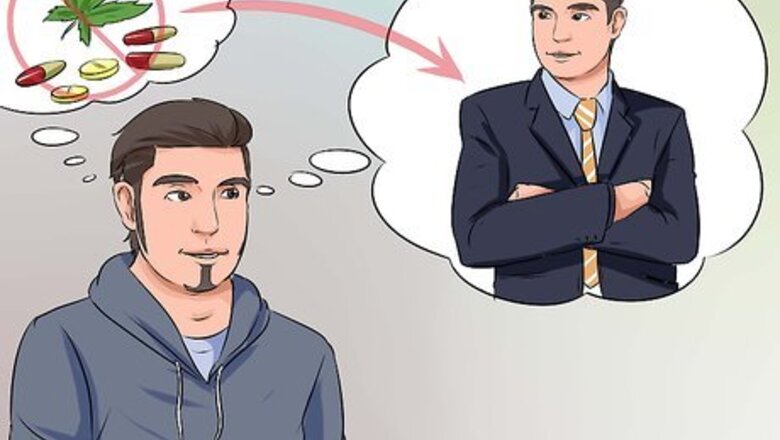
views
Handling the Temptation to Try Drugs
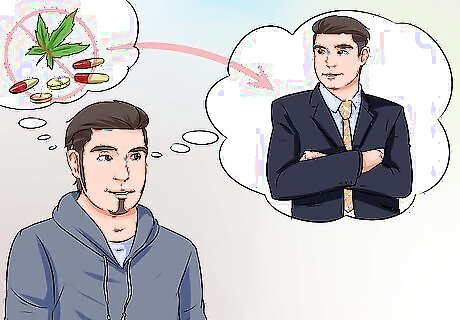
Set goals for yourself. Studies suggest that having goals (and people who support those goals) may help you be less likely to use drugs. This is likely because it encourages you to consider what you want out of your future and what you'll do to get yourself there. In contrast, using drugs is all about what feels "good" right now, regardless of the impact it makes on your future. If you feel tempted to try drugs, even once, consider what it may do to your goals for the future. How likely are you to be able to achieve your goals if you're dependent on an expensive and/or illegal drug, or in jail or with a criminal record for using it? Setting goals can also help improve your self-confidence. When you feel confident in yourself and your ability to achieve what you set out to do, you're less likely to want to do drugs. Setting and achieving goals is also crucial to getting off of drugs. This practice shows you that you can achieve what you set out to do, including kick your drug use.

Spend time with your loved ones. Strong relationships with your family and loved ones are a protective factor against drug use. In other words, having a strong relationship with your family and friends will make you less likely to give in to temptation. If you're feeling pressured or curious about drug use, don't keep it to yourself. Find someone you know, trust, and respect to talk to about it. Other people can offer you advice and support, which is very important for staying drug free.
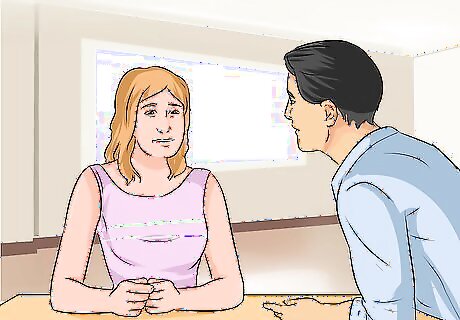
Talk to someone about what's going on. If you're consistently being pressured, even bullied, to try drugs, talk to someone in authority, such as a parent, teacher, or counselor. You don't have to face this pressure on your own. Getting support from others will help you stand strong against drugs.
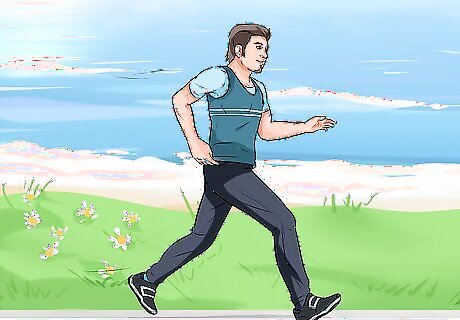
Do something else to feel good. If you are tempted to use drugs because you want to feel good, keep your focus off of drugs by doing other things that are enjoyable and fun. For example, take up a hobby, spend more time laughing with friends, play a fun video game, or help others out, to feel better instead. This will help you find new meaning in your life.. Go for a run, get lost in a good novel, talk to family and friends, play a fun video game, or actively try to solve your problem or negative thoughts by seeking counselling. Talk about how you feel with friends or engage in a distracting activity like going out to a movie.
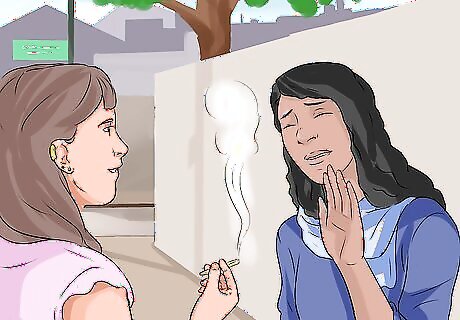
Stop before you start. If you're offered drugs, decline and walk away. If you're afraid of peer pressure, then know in your heart that true friends will respect you if you decide to say no to a drug, and they won't push you into doing something you don't want to do. If they do, then consider finding a new group of friends.
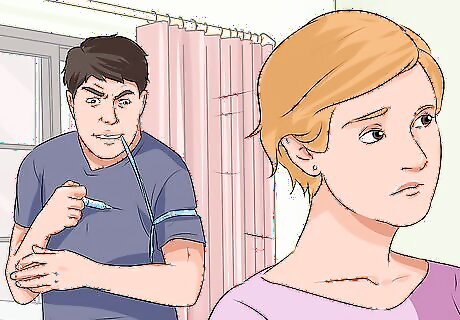
Keep your distance. If you see a family member or friend taking drugs, stay away from them and definitely don't follow in their footsteps. If you can, talk to a trusted adult friend about it; they may offer guidance or social support. A support system can be crucial to a person's success in achieving and maintaining a drug–free lifestyle. Be aware that vulnerability to drug addiction can run in the family, so if you have a family member who is addicted to drugs, know that you may be especially vulnerable and should do that much more to be drug free. If you have friends who actively use drugs, find new friends. Instead, surround yourself with people who do not use drugs and who think being sober is a better way to live. Teens are especially likely to use drugs if their friends do.
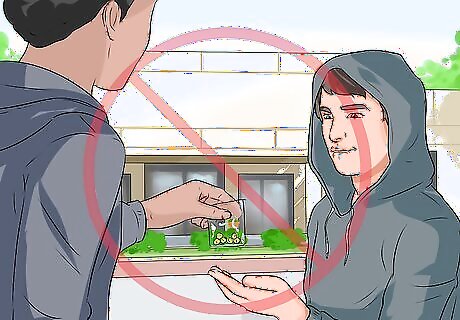
Avoid temptation. If there is a certain group of people at school who are known to do drugs, don't hang around them. You can find friends who are interested in more productive behaviors. If you are at a party and you realize that there are drugs there, simply leave. Peer pressure might make you crack, even if you're certain you'll be able to say no. Be aware that social influence is very strong, and it has an effect on your temptation to use drugs. Even social media can influence you to be more likely to use drugs. If you notice a lot of photos about drug use on your social media, consider blocking those sources of influence too.
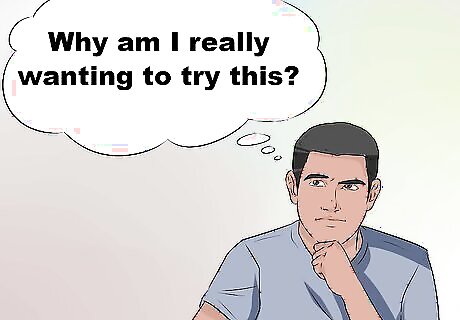
Reflect on your temptations. If you're tempted to try drugs even when you're on your own, such as seeing what it would be like to experiment with your kid brother's Adderall, you can handle that temptation too. Think to yourself, "Why am I really wanting to try this?" What are your reasons for wanting to try drugs? If it's because you think everyone else is doing it and you want to connect with your buddies, remind yourself that not everyone is doing drugs. In fact, drug use in general is down among young people. There are plenty of great, healthy ways to connect with your friends, such as taking up a hobby or sport together. If it's because you're feeling stressed or pressured, recognize that drug use is a common way to handle stress, but it's very unhealthy. There are great ways to handle stress, such as exercise, yoga, and meditation. If you feel really stressed out, talking to a therapist could help too. Remember that your decision-making skills haven't fully matured if you're a teen. Choosing to use drugs is a decision that could haunt you for the rest of your life. Will your 50-year-old self thank you for deciding to try drugs?
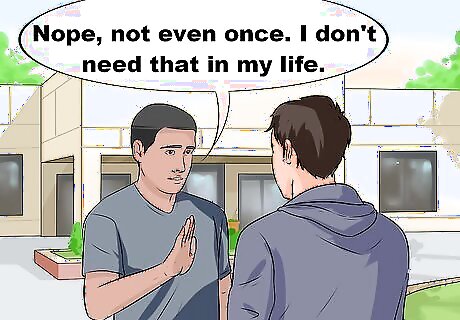
Say no assertively. Most likely there will come a time when you will be asked to do drugs. Be firm in your answer and do not hesitate. If you hesitate you leave the door open for peer pressure. If someone who offers you drugs asks you why you do not want to do them you do not need to give any reasons. Just say that you don't do drugs. If you provide reasons you leave the door open for further conversation, where the person can then try to persuade you to try the drugs. You may have people try to change your mind by saying things such as "But everyone's doing it" or "Just once won't hurt you." Remain firm. You can tell the person that in fact, drug use has gone down among young people, so clearly not everyone is doing it, and you won't be either. Or you can say "Nope, not even once. I don't need that in my life."

Stay engaged. Keep your mind sharp and actively involved in the world around you. If you stay engaged and busy and active you will not have the time to do drugs. Boredom can lead to drug use, so by never being bored you will be less likely to use drugs. Learn a new language. Pick up a hobby. Teach yourself a musical instrument. Volunteer in your community. You will enrich your life (and boost your resume) and help yourself stay away from drugs.
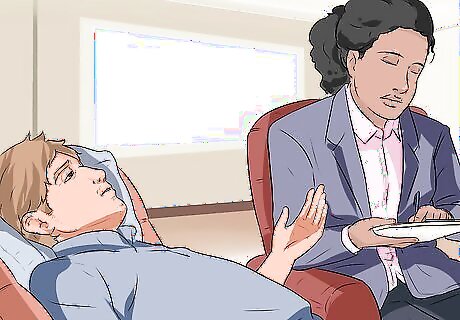
Figure out what makes you happy. Depression and low self-esteem can lead to drug use. If you are experiencing depression, you should seek a counselor to help you work through it. In addition, pursuing things that make you happy and maintain your self-esteem will make you less likely to default to drug use. Make a list of everything that makes you happy. Pick a few that are easily attainable, such as experiences like cooking an inexpensive meal, or going to the movies, and be sure to engage in those activities regularly.
Refraining From Using Drugs Again
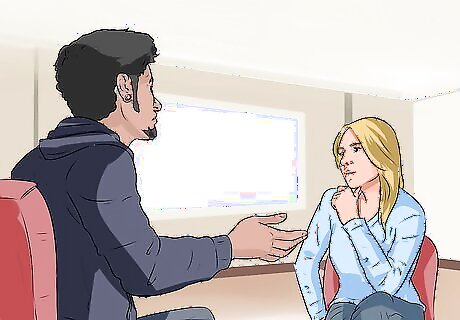
Understand why people use drugs. People become addicted because they are self-medicating. Then they are held within the cycle of addiction because of the withdrawal symptoms from the drug.The way to become drug free is to first confront the physical addiction through going to a clinic where you can participate in a program to help with the withdrawal symptoms, which at times can be life-threatening, and then addressing the emotional issues that lead to the decision to use addicting drugs to mask the emotional pain. People who use drugs are not “bad” or “immoral” people. People who use drugs often cannot simply “knock it off.” Drug addictions change your brain in ways that make it difficult -- but not impossible -- to quit.
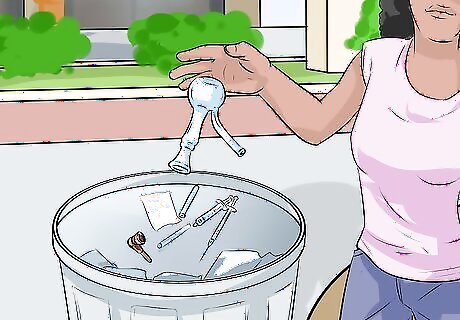
Know your triggers. If you have used drugs before, be cognizant of the triggers that are associated with your using drugs. This could include drug paraphernalia, a group of friends, a certain location, or even a certain song that you used to listen to when you did drugs. If there are certain triggers that you know may cause a problem and lead to drug use, throw them away. Delete that song from your ipod or throw out those rolling papers; if your triggers are permanently gone you will be less likely to use drugs. You may also need to not go to places you used to go when you used drugs. Staying away may be difficult, but it will help you kick your drug use.
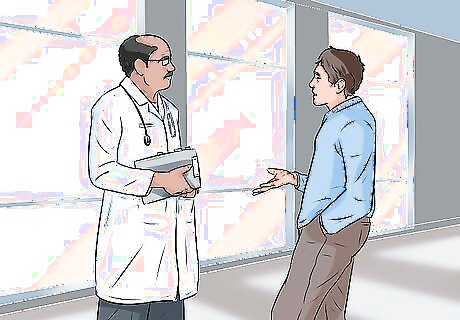
Join a community or family-based recovery support system. Support is key not only to staying off of drugs, but to getting off them. If you are struggling to live a drug free life, a support group may be helpful. To find one, talk to your doctor, counselor or other healthcare provider, check your phone book for a list of local support groups, consult with your religious or secular community groups, or speak with local or national groups who are devoted to helping people get past addictions.

Try “urge surfing.” Urge surfing is a mindfulness exercise that acknowledges your craving and helps you “ride it out” until it goes away. Imagine you are a surfer riding your craving like a wave until it breaks and becomes soft and small and easy to handle. Urge surfing is more effective than trying to ignore or repress a craving. Remind yourself that this probably is not the first time you have experienced the urge to do drugs. Has that urge passed before? The answer is almost certainly yes. Remind yourself that it will pass this time too. The urge exists, but you do not have to act on it. Notice the thoughts and sensations that you experience during the urge. For example, you might feel a strong feeling that you want to use your drug of choice. You might feel sweaty or itchy, or feel restless. Acknowledge these as existing. Remind yourself that they are just thoughts; they do not truly have power over you. Focus on deep breathing as you surf your urges. Breathe slowly and evenly, in and out. This will help keep your attention on the present moment rather than focusing on your craving.
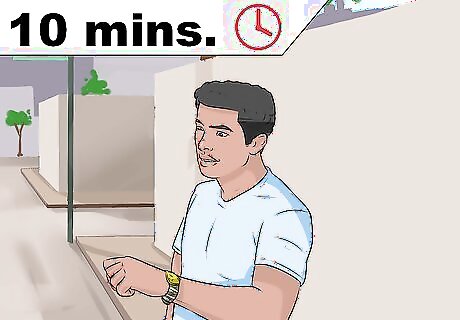
Tell yourself you'll wait 10 minutes. If you feel a very strong urge to use drugs, delay by telling yourself you will make yourself wait 10 minutes. Just 10, that's all. You can do that. When that 10 minutes is up, if the urge is still strong, tell yourself you'll wait another 10 minutes. Keep delaying until the urge passes. It will, given enough time.
Keeping Your Body Healthy
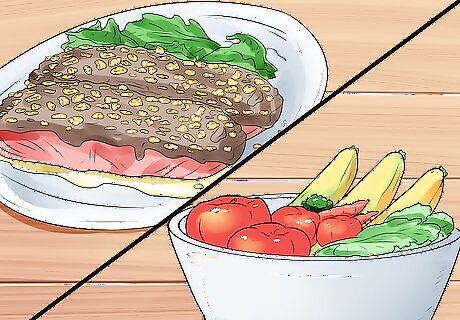
Eat healthy. The mind and body are intricately related because the mind consists of the complex workings of the brain, a biological organ and part of the body. This means that mental health and bodily health are closely related. Since poor mental health is associated with drug use, and mental and bodily health are related, keeping a healthy body is an important part of being drug free. One way to maintain a healthy body is to eat healthy foods. Eat whole foods such as lean meats, nuts, fruits, and vegetables. Who knows, you might even develop a passion for cooking that builds your self-esteem and turns into a hobby that helps to keep you drug free.
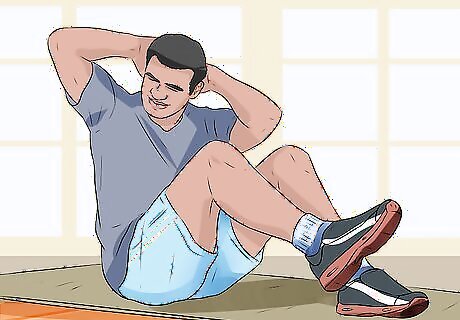
Exercise. Working out can release endorphins that make you feel good in a much healthier way than the way that drugs make you feel good. Exercise helps to reduce stress and can even combat minor cases of depression; both stress and depression increase risk for drug use, so it is important to exercise regularly to help to keep drug free.
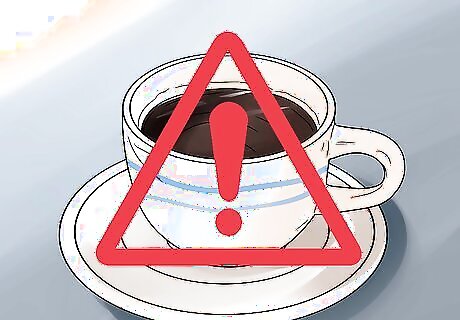
Avoid having too much caffeine. Too much caffeine can make you jittery and anxious which can contribute to feelings of stress and make you more likely to turn to using (other) drugs to counteract the anxiety that the caffeine produced.
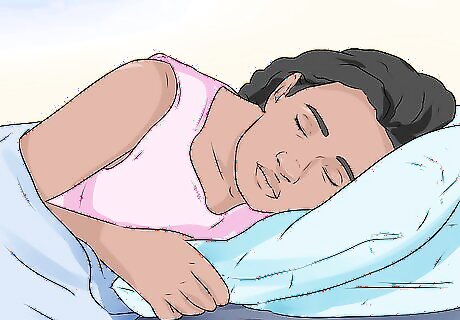
Get enough sleep. A lack of sleep can contribute to poor mental health such as by causing feelings of fatigue, sadness, and anxiety, all of which may add to your likelihood of using drugs in order to avoid feeling bad.
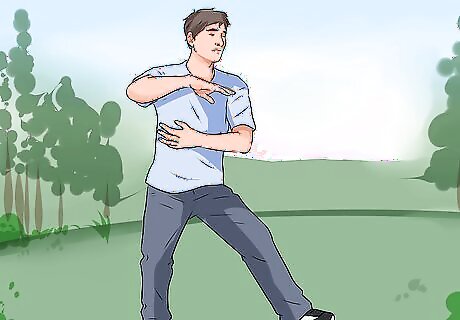
Relax your body and mind. Practice relaxation techniques to help stay mentally and physically healthy. Relaxation techniques reduce the impact of stress on your body by negating negative feelings and negative bodily sensations such as muscle tension. Stress is a common reason that people begin using drugs, so managing your stress will help you stay drug-free. Try visualization. This technique involves forming peaceful and relaxing mental images. For example, picture a calm ocean and try to imagine it with all of your senses; think about how it would smell, how the wind and sun would feel against your skin. Fully immerse yourself in the experience. Try a soothing exercise, such as yoga or tai chi.
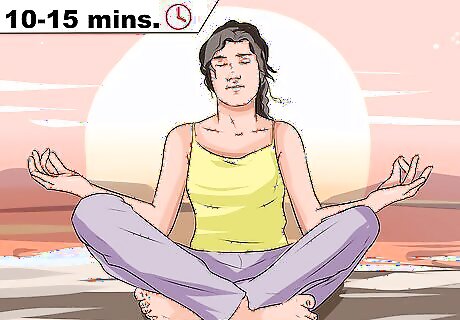
Try meditation. Meditation can be an excellent way to manage stress and focus on breathing and body awareness. Meditate to calm yourself as you confront urges to use alcohol or drugs. People who meditate tend to have greater success rates of staying off drugs in the long run. Find a comfortable and quiet spot to sit for 10-15 minutes. Focus on your breath, inhaling deeply and steadily. As thoughts pass through your mind, release them without judgment. Turn your attention back to your breath.
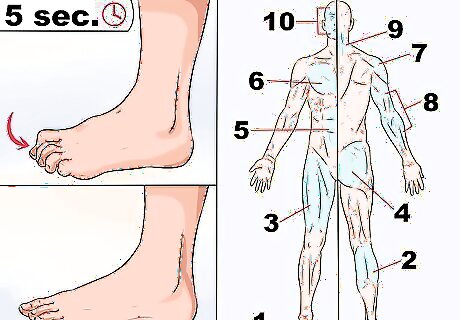
Try progressive muscle relaxation. This technique helps you to figure out the difference between tense and relaxed muscles. It involves slowly tensing then relaxing each muscle group; this will help to delineate the difference between tense and relaxed and take your mind off what is stressing you out. Begin with your toes. Clench them as hard as you can for 5 seconds, and then relax for 5 seconds. Notice the sensation of relaxation. Move up your body from your calves, thighs, buttocks, abs, chest, shoulders, arms, neck, and face.
Seeking Treatment
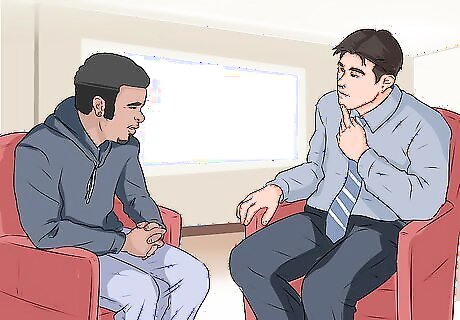
Seek counseling. People who are recovering from an addiction need guidance and treatment. Counseling can offer you the support you need to remain drug free when giving up or recovering from an addiction. Behavioral treatment, such as cognitive behavioral therapy, is very effective in helping people who use drugs manage their urges and stop their drug use. Family therapy can also be helpful, particularly if your family dysfunction is contributing to your drug use. Contingency management uses positive reinforcement, such as rewards, for staying off drugs.
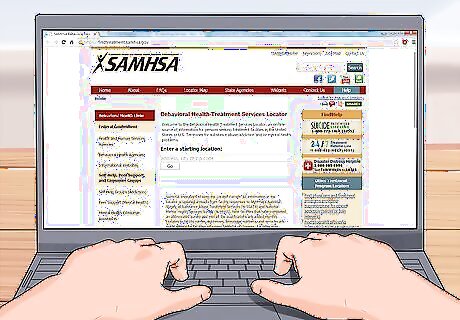
Consider attending a detox facility. There are benefits and drawbacks to inpatient or outpatient facilities. Inpatient facilities enable close monitoring, remove the potential for drug use, and the detox process is fairly accelerated. However, these can be quite expensive and may limit other activities, such as work. Outpatient treatments cost less and have less of an impact on the individual's life, but may not be as effective due to the potential for access to drugs due to being outside of the facility.This has the advantage of being less disruptive to the patient's life and less expensive. The best setting depends on a variety of factors, including the drug of abuse, the drug user's amount and length of history of abuse, the patient's age, and co-existing medical and/or psychiatric conditions among others. To find a detox center, search here: https://findtreatment.samhsa.gov/ People with serious drug use problems, a long history of drug use, involvement in criminal activity, or trouble with social functioning due to drugs are often helped by residential treatment at a detox facility.
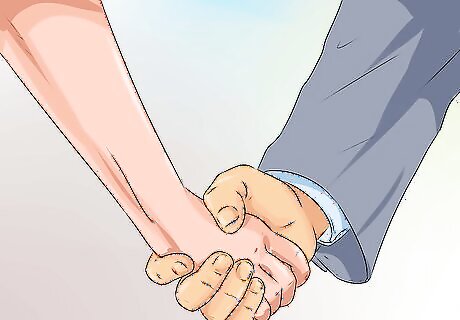
Find a sponsor. Many peer-based support groups assign sponsors to new members. The sponsor is a recovering addict who will help you through the steps of the recovery program. A good sponsor will: help you to grow, to become more productive, by your definition. help you become more autonomous, more loving of yourself, more excited, less sensitive, more free to become the authority for your own living. not be a crutch or be around you if you fail to make progress.
















Comments
0 comment